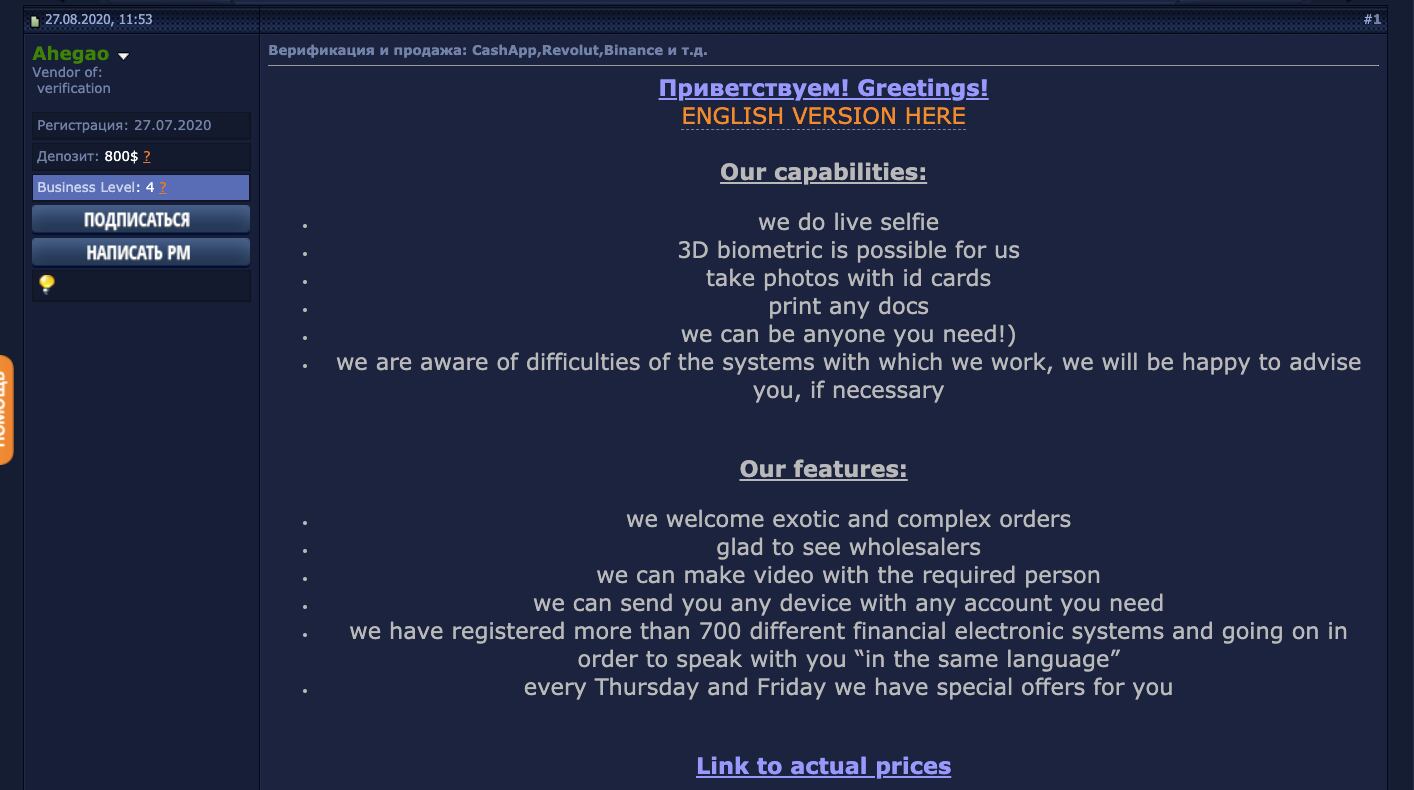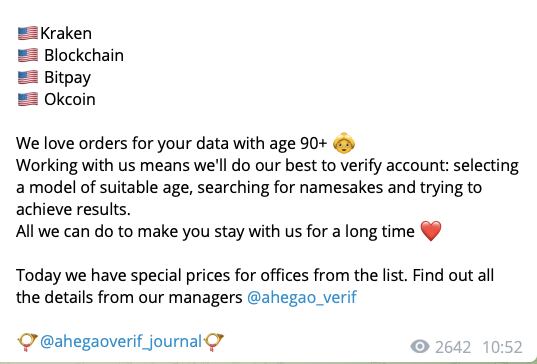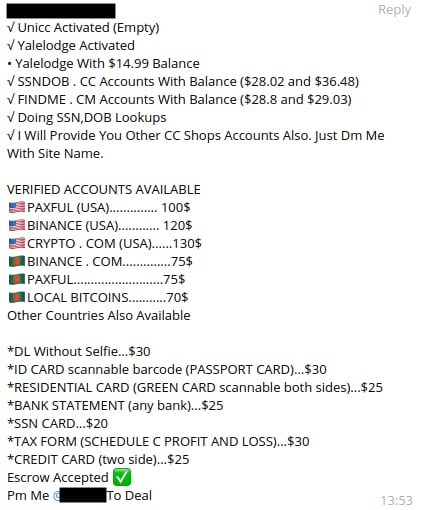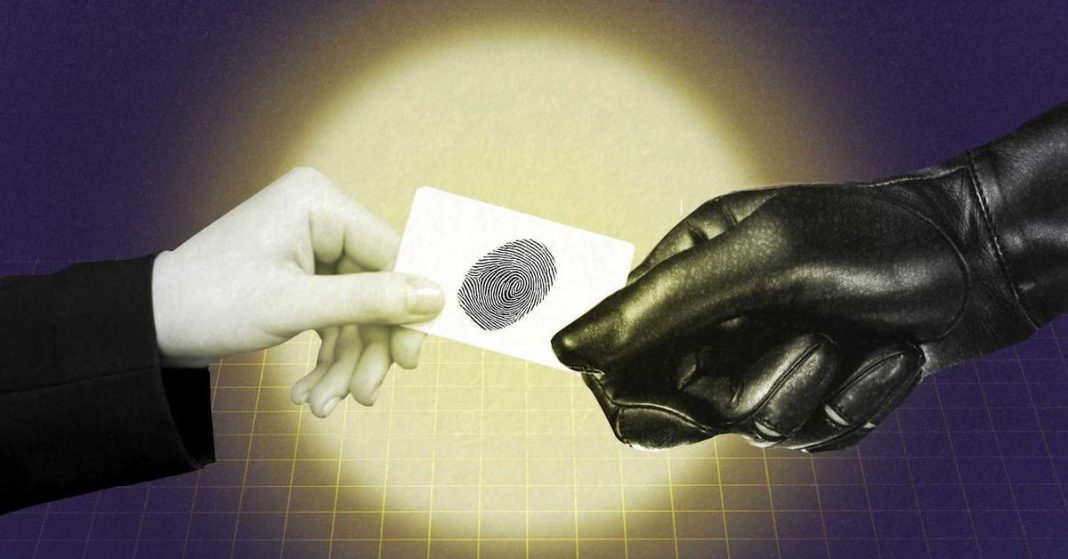For law-abiding cryptocurrency customers, getting verified to commerce on an trade is a painstaking course of. They have to give out a wealth of private knowledge, together with their residence addresses, scans of government-issued ID, and photograph or video selfies.
For criminals, it’s simpler. They will pay as little as $150 on the black marketplace for a ready-to-use, verified account in another person’s title at Coinbase Professional, Binance.US, Kraken or quite a few different exchanges, a CoinDesk investigation discovered.
To be clear: “verified” on this context doesn’t imply reputable. Underground distributors create these accounts with different individuals’s identities or below made-up names, tricking the exchanges into verifying them as legitimate customers. They then promote these verified accounts on the market on web boards and on Telegram.
Apart from crypto exchanges, the distributors additionally provide fraudulently created accounts to be used with mainstream fee suppliers equivalent to Sq.’s Money App and Transferwise.
“We’re producing from 1,500 to 2,000 artificial verified accounts every month,” an operator of 1 such service advised CoinDesk in an interview by way of the Telegram messaging app.
This service has a number of workers and even “departments” throughout the enterprise, stated the particular person, who refused to provide a reputation. And it has no scarcity of opponents, CoinDesk’s investigation discovered.

A CoinDesk reporter reviewed a pattern of crypto and fee accounts that had been bought from a number of black-market distributors. The train revealed these distributors are, in lots of circumstances, trafficking in delicate details about individuals who doubtless don’t know their names are on the accounts.
It additionally confirmed how individuals who, for no matter purpose, don’t need to expose their actual identities or worry they wouldn’t be accepted for an account can skirt the business’s customer-vetting processes – no less than, up to some extent.
Whereas it’s tough to gauge the dimensions of this market – criminals don’t usually publicize their income, in any case – it seems to be flourishing.
“We’ve noticed a staggering quantity of menace actors promoting and brokering fraudulent accounts for each crypto exchanges and fee companies,” stated Andrew Gunn, senior menace intelligence analyst at ZeroFox, a cybersecurity agency based mostly in Baltimore.
Over the previous 12 months, ZeroFox discovered over a million posts on boards and Telegram messaging-app teams promoting accounts on the market, Gunn stated.
The truth that you should buy a pretend digital identification for round $200 raises recent questions concerning the effectiveness of “know your buyer” (KYC) insurance policies carried out by crypto companies world wide. Whereas on a regular basis customers typically should submit the identical info a number of occasions for reverification and wait for weeks or months to withdraw their cash (even Martha Stewart reportedly waited two weeks to get verified), dangerous actors can sneak in simply.
In plain sight
Black markets thrive each on the so-called darkish internet, which is accessible by means of the anonymizing Tor browser, and on the clear internet or floor internet – the a part of the web most of us browse every single day.
Right here, in plain sight, are stay boards populated by skilled hackers, scammers of all types and sellers of unlawful items. To call some, Russian-speaking boards equivalent to Ver.sc (brief for “Verified”) and CCCC.sb are targeted on unlawful identity-related companies equivalent to “carding” (trafficking in stolen or counterfeit bank card numbers).
On these platforms, one can simply discover on the market accounts to be used on a various vary of crypto exchanges and fee companies, from peer-to-peer buying and selling platform Localbitcoins to skilled buying and selling venue Coinbase Professional to mainstream fee companies CashApp, Transferwise and Revolut.
Costs, starting from $150 to $500, are disclosed to a potential purchaser in a private chat or posted on a value listing just like the one on this internet web page. To purchase an account, one must get in contact with a vendor (typically by way of Telegram), pay in crypto (often bitcoin) and get the requested account knowledge.
Generally the accounts initially had been registered by reputable prospects and have been hijacked by hackers. (For a purchaser of such an account, there’s all the time the danger that its precise proprietor will discover one thing bizarre is occurring and flag it to the platform administrator.) Generally distributors create accounts from scratch utilizing stolen or pretend knowledge. Generally customers register accounts in their very own names after which flip them over to distributors to promote.
In line with posts on the boards and conversations with a few of the distributors, they undergo the exchanges’ verification course of to open accounts, and management the accounts till they’re bought. Individuals whose info is used for registering with the companies may not even know the accounts exist.
On the identical boards the place some distributors provide these fraudulent accounts, others look to rent “drops,” or people prepared to lend their identities for account registration. In the meantime, individuals prepared to fill this function seek for “job postings.” There are additionally a number of choices of counterfeit IDs.
Lend me your face
The job of a drop is nicely defined by a latest dialogue on the CCCC.sb discussion board (the posts are translated from Russian).
“Searching for a job as a cash launderer. Ship provides to my DM,” one person wrote in July.
“Of a drop,” corrected one other person in a reply earlier than describing the function: “Solely your face is required. To cross video verification by way of WhatsApp. From 1,500 to 2,000 rubles [$20-$28] for a cross, you are able to do a number of passes a day.”
“The duty is to cross verification on an trade in actual time. You should utilize your passport/driver’s license/overseas passport. Additionally gonna have to take a selfie. You get 500 rubles [around $7], after the profitable verification,” says one other publish on the Bhf.im discussion board, including {that a} “job seeker” will simply want to provide a full title and date of beginning after which click on on a hyperlink. The poster used a photograph of the rapper Lil’ Pump as their profile image.
Extra typically, distributors don’t promote actual costs for such companies within the postings however convey them one-on-one by way of chat.
Some distributors act as middlemen, providing to attach customers with drops, a lot as a ridesharing app matches passengers with drivers. One advert boasts that the drops are out there to work at any time.
However generally you don’t even want anybody’s actual private knowledge to confirm an account, the seller who spoke to ConDesk stated: You may make issues up.
“It’s a vulnerability KYC programs have. If you understand how to generate [synthetic] knowledge, you employ it. KYC programs usually are not a customs checkpoint with a shared database and verified details about any potential person,” they stated.
The ‘fullz’
Consumers should buy accounts registered below no matter names distributors have in hand or order customized accounts based mostly on private knowledge (“fullz”) they themselves, by no matter means, have obtained.
Some distributors promise they’ll do all the mandatory analysis on the actual individuals whose knowledge is getting used, together with credit score and background checks.
If nothing works, they stand able to seek for individuals with the identical names, even when an individual whose title is getting used is older than 90, distributors say in promoting posts.

“Working with us means we’ll do our greatest to confirm accounts: deciding on a mannequin of appropriate age, trying to find namesakes and making an attempt to attain outcomes,” one vendor wrote in a Telegram publish illustrated with a cheeky meme.

In one other publish, the seller describes software program that permits the creation of faux selfies, together with video.
“We do stay selfies. 3D biometric is feasible for us. take photographs with id playing cards. print any docs. we might be anybody you want,” the identical vendor marketed on the paid discussion board Ver.sc.
A few of these distributors simply publish every now and then that they’ve account on the market or wish to purchase some. Others run common outlets, with devoted groups and buyer help finished by way of Telegram. Their posts are adopted by testimonials from happy prospects.
The pattern
CoinDesk reviewed a pattern of accounts at exchanges Binance.US, Coinbase Professional and Kraken and fee companies Money App and Wirex that had been out there for buy on the black market. The accounts had been put up on the market by a number of totally different distributors. The costs of those accounts ranged from $170 to $250, all paid in bitcoin.
Together with login credentials, these accounts got here with personal knowledge of the purported account homeowners, all of whom gave the impression to be real U.S. or European Union residents. The information included dates of beginning, road addresses and, within the case of the U.S. residents, Social Safety numbers.
A lot of the accounts got here with directions for utilizing a digital personal community (VPN) to disguise an IP tackle so an trade would suppose a person was logging in from, say, Miami as a substitute of Moscow. In some circumstances, distributors included credentials for a Gmail account (with Google Voice cellphone quantity), presumably for multi-factor authentication (MFA) when logging into the monetary service – and a restoration e-mail tackle in case Google asks for verification, too.
After reviewing the accounts, CoinDesk contacted the crypto exchanges and fee companies to test their authenticity. Not one of the corporations would say whether or not the accounts had been real, explaining they’ll’t touch upon particular person accounts.
Binance.US despatched CoinDesk an e-mail signed by “Binance U.S. PR,” saying the corporate “believes this to be a pretend account.” The trade didn’t reply to a follow-up query asking whether or not by “pretend” the consultant meant it was nonexistent or fraudulently created.
CoinDesk searched on-line databases equivalent to Spokeo, SearchPeopleFree and ClustrMaps and located 4 individuals whose names, years of beginning and cities matched these on the black-market accounts. Two of these individuals had matching road addresses as nicely.
Makes an attempt to contact these and different people whose names had been on the reviewed accounts by cellphone, e-mail and social media had been unsuccessful, and CoinDesk has mailed them letters to alert them their knowledge is doubtlessly being abused.
We additionally referred to as the cellphone numbers used to register the accounts – all of them besides one turned out to be Google Voice numbers, that means they’re digital numbers generated by Google. Customers can register digital cellphone numbers with out getting contracts with a cell supplier. This has made Google Voice numbers a useful instrument for scammers.
The e-mail addresses related to the accounts didn’t match the names below which the accounts had been registered, and as a substitute contained random-seeming mixtures of names and numbers.
Made to order
“It’s fairly exhausting to guage the whole quantity of this market, as we’re most likely the one public instance of such a enterprise with departments and streamlined processes,” the seller who spoke to CoinDesk stated.
“Our colleagues who’re working related companies are both working very small enterprises or promoting accounts of actual individuals, who’re both going by means of some exhausting occasions or have been deceived,” they added.
However ZeroFox’s Gunn stated the marketplace for these accounts on the market is huge, with some Telegram channels counting hundreds of members.
“The sheer quantity of menace actors specializing on this has even pushed costs all the way down to very affordable ranges (anyplace from $50 to $300 per account, relying on the trade or service in query),” Gunn stated.
Whereas Gunn’s analysis focuses on Jap Europe, he stated stolen, hacked or artificially created accounts at fee companies or crypto exchanges are bought all around the world and marketed in a number of languages.
Along with ready-to-use accounts, the black-market distributors provide “on-demand, virtually a la carte companies, based mostly on buyer wants,” Gunn stated.
They may also help their “shoppers” register fraudulent accounts by promoting compromised private knowledge or “providing help throughout any step of the verification course of,” together with digital rendering of faces to cross photograph and video verification, which main crypto exchanges typically require.

‘Go right here, click on this’
ZeroFox recognized no less than one case when a gaggle was hiring people on a contract job platform to do account creation and verification, after which hand these accounts over, for as little as $5-$10 for every cross, Gunn stated. The group was giving exact directions to the individuals prepared to do the job: “go right here, click on this, use this ID,” Gunn stated.
Additional investigation confirmed the group managed to create and promote “hundreds of verified accounts” on a single platform, he stated. Gunn wouldn’t title that platform.
Getting fraudulent accounts is a slam dunk for prison teams, Gunn stated. “These accounts are very simple to return by, comparatively low-cost and disposable, so within the prison underground it’s very trivial to purchase as many as you need. And in case you lose one account you simply purchase one other one,” he stated.
For companies, discovering and shutting down fraudulent accounts can get extraordinarily tough, Gunn stated.
“A few of these accounts are dormant till cash strikes by means of them, and if an actual particular person verified them how would they know?” he stated. “Safety measures [implemented by the platforms] are fairly good, however there’s all the time a method round.”
It’s unclear how lengthy such accounts stay operational till a service notices one thing suspicious and shuts them down. The lifespan of an account depends upon the way in which it’s getting used, the black-market vendor advised CoinDesk.
“We’re offering an account that primarily appears to be like no totally different from the one you or your buddy would register. They’re totally compliant with the KYC necessities, besides they’re totally artificial,” the particular person stated, including that customers’ personal reckless conduct, fairly than the standard of the account, can set off exchanges’ fraud alerts.
Gunn agreed that it’s potential for the customer of an artificial account to fly below the radar. “In the event that they took precautions to mix in with regular conduct (not exceeding transaction quantities, and many others.), leveraged residential proxies matching the knowledge and geolocation of the sufferer, to call a few objects, the accounts may final indefinitely,” he stated.
The commerce in crypto trade accounts is only a subset of a bigger international black ID market. In line with a 2020 report by the cybersecurity agency Digital Shadows, there are greater than 15 billion credentials on the earth on the market, and probably the most worthwhile are “financial institution and different monetary accounts,” which promote for $70.91 every, on common. That is dwarfed solely by the costs of area administrator entry to company programs, the place the worth tag can go as much as $140,000, Digital Shadows stated.
Apparently, unlawful entry to cryptocurrency companies is valued someplace within the center, with some accounts bought for as excessive as $500 every.
Countermeasures
Some platforms CoinDesk contacted confirmed they had been conscious of the black marketplace for their accounts.
“We’ve got staff members devoted to monitoring the darkish internet for accounts stolen by means of malware or phishing, in addition to ‘mule accounts,’ that are put up on the market as fronts for criminals to launder funds,” a spokesperson for Kraken advised CoinDesk by way of e-mail. “Relying on the state of affairs, we are able to both restore the account again to the rightful proprietor or disable it with quick impact and take acceptable motion as obligatory.”
At Coinbase, a menace intelligence staff “displays darknet markets and different cybercriminal boards,” the Nasdaq-listed trade’s head of communications, Jaclyn Gross sales, advised CoinDesk.
“Like every other monetary establishment, Coinbase implements measures to guard accounts from fraudulent actors. For safety causes we don’t disclose specifics of these measures, as we don’t need to present fraudsters with info that could possibly be used to bypass these controls.”
Binance.US’s press consultant advised CoinDesk by way of e-mail that the corporate is intently watching how customers are logging into their accounts every time they use them.
“Our threat administration system collects a big selection of indicators throughout account opening, subsequent logins and through every account interplay, and we monitor these indicators to establish doubtlessly high-risk accounts or associated exercise and stop malicious conduct,” the spokesperson advised CoinDesk.
A CashApp spokesperson stated the corporate can also be monitoring customers’ conduct to detect potential fraud.”Along with our customary buyer info and verification packages, we use numerous behavioral indicators, info offered by our prospects and numerous distributors, in addition to transactional patterns to research and detect when accounts could also be suspicious for numerous dangerous exercise, together with fraud and identification theft,” the corporate stated in a written assertion to CoinDesk.
Gunn’s agency ZeroFox helps fee app firm Wirex to “monitor and take down impersonations of Wirex, and people malicious actors claiming to promote Wirex accounts on the darkish internet,” Wirex Communications Supervisor Lottie Wells advised CoinDesk by way of e-mail.
The choices, in response to her, are considerable.
“Between the start of June and [September], now we have monitored almost 400,000 hyperlinks, accounts and posts, we recognized and remediated (blocked, took down, deleted, and many others.) over 1,500 items of content material. In truth, 32% of this was particularly from the darkish internet,” Wells stated.
To forestall fraud, Wirex employs “a variety of compliance, tech and safety measures,” relying “on the danger profile of a person, the character of transactions and our third-party companions who help us on evaluating exterior situations,” Wells stated.
“We additionally work intently with regulators to mitigate account takeover dangers, and report them the place obligatory,” she added. “Any buyer accounts that could be compromised are shortly blocked and guarded, whereas our buyer help staff works with our prospects to guard their accounts.”
CoinDesk additionally requested cryptocurrency trade Huobi in addition to fee companies Transferwise and Revolut, for remark. All of them are talked about within the advertisements posted by fraudulent-account distributors.
TransferWise spokesperson Chris Monteiro stated that the corporate works with legislation enforcement “to assist stop additional criminal activity” when it learns about “particular organized fraud circumstances.”
“For our prospects, in the event that they really feel they’ve been a sufferer of fraud they need to report it to the police instantly, and we encourage them to get in contact with us immediately,” Monteiro added.
Huobi declined to remark. Revolut didn’t reply by press time.
Bitter capsule
The audience for these accounts on the market are individuals concerned in different prison actions, Gunn stated.
“Risk actors which are buying the created and verified accounts are leveraging them for no matter prison exercise they do, whether or not it’s a carding operation or promoting malware or present card rip-off,” he stated. “That is one a part of the method that helps them to remain nameless fairly than having crypto accounts on their names on these exchanges.”
The seller who spoke to CoinDesk used extra delicate language, saying customers avail themselves of its companies to keep away from “taxation dangers.”
As legislation enforcement businesses world wide undertake blockchain-sleuthing software program, it makes much more sense for criminals to cowl their tracks by shopping for and promoting crypto by means of accounts registered in others’ names, Gunn stated.
Sergey Mendeleev, founding father of Estonia-registered crypto trade Garantex and CEO of funding platform InDeFi, defined to CoinDesk how these “mule” accounts is perhaps used to obscure the connection between crypto and its precise proprietor.
“If you happen to purchase monero for fiat, then withdraw it after which deposit by way of one other account, you’ll be able to promote it for bitcoin and get clear, exchange-originated bitcoin, not related to the earlier transactions. This scheme is kind of widespread, and there are tens of others,” Mendeleev stated.
Another excuse there’s demand for artificial accounts might be so simple as this: Individuals dwelling in international locations sanctioned by the U.S. and EU or with prohibitive anti-crypto rules can’t register below their actual names on the most important crypto exchanges.
Sergey Zhdanov, chief working officer of London-registered crypto trade EXMO, advised CoinDesk his firm has caught some customers faking their KYC knowledge. The customers defined they had been based mostly in territories below worldwide sanctions, in order that they wouldn’t be capable to register with their actual IDs, he stated.
“Some customers simply actually admitted that they had been based mostly within the DNR [Donetsk People’s Republic, a disputed area in southeastern Ukraine] or North Korea, in order that they purchased their paperwork [to register]. We block such accounts,” Zhdanov stated.
China, which has been aggressively pushing crypto overseas, seems to be a brand new progress marketplace for the bogus ID enterprise. Dovey Wan, founding father of the Primitive Ventures crypto fund, advised CoinDesk the marketplace for verified accounts for Chinese language customers is “vibrant.”
The distributors “promote in Telegram teams as ‘KYC service,’” Wan stated, including that “you merely ask within the Telegram teams (largely in Chinese language ones) that ‘I desire a KYC service’ [and] individuals will pop up.”
The seller CoinDesk spoke to confirmed their service is changing into widespread in China: “For the time being, we’re seeing curiosity in our companies from Chinese language individuals. No want to elucidate, I assume. 🙂 “
Marc Hochstein, Danny Nelson and Daniel Kuhn contributed reporting















